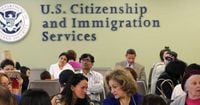The Trump administration's controversial proposal requiring Green Card holders and asylum seekers to disclose their social media accounts has sparked significant debate about privacy rights and freedom of expression. Announced on March 5, 2025, this measure could dramatically alter the landscape of immigration policy in the United States, affecting millions of legal residents, many of whom have invested their lives in the American dream.
This proposal extends an existing policy initiated in 2019 under Trump’s previous term, which mandated that visa applicants disclose their social media handles to the U.S. Citizenship and Immigration Services (USCIS) as part of their vetting process. Now, the administration aims to expand this requirement to those already residing legally in the United States, including Green Card holders and asylum seekers. The stated rationale for this move centers on national security, with the USCIS arguing that tracking social media activity enhances identity verification and national security screening.
Critics, however, are raising red flags. They worry about the implications for free speech and the chilling effect this policy could have on political expression among immigrants. The fear is that residents will hesitate to voice opinions critical of U.S. policies or engage in political activism due to the potential repercussions of government scrutiny. One immigration policy expert from the American Civil Liberties Union (ACLU) articulated these concerns sharply: "This could be a modern-day loyalty test, where your online activity determines whether you can stay in the U.S."
In addition, critics argue that this policy could lead to selective enforcement, disproportionately targeting immigrants from certain backgrounds or those who express views that challenge the administration. Many immigrant rights advocates fear that the policy could function as a tool for ideological policing, potentially barring activists or critics of the administration from gaining or retaining permanent residency.
One anonymous public comment in response to the proposal encapsulated the mounting frustration: "The U.S. is heading for authoritarian now. Anything that the current administration doesn’t like means bad. Pure ideology means total destruction. This is a violation of the First Amendment." Indeed, the proposal has drawn harsh criticism from various sectors of society, including civil rights organizations and immigrant advocacy groups, who assert that requiring individuals to divulge their social media information infringes on fundamental civil liberties.
Adding to the momentum of criticism is the existing landscape of immigration policies under Trump, which have emphasized stricter vetting and more aggressive enforcement against undocumented immigrants. The administration's hardline stance was notably reinforced by an executive order issued on Trump’s first day back in office on January 20, 2025, directing federal agencies to collaborate in combating what he described as "an invasion" of illegal immigrants.
In recent weeks, this aggressive immigration enforcement has led to alarming incidents involving Green Card holders and visa holders. Numerous individuals, including students and professionals, have encountered legal challenges and detention upon attempts to return to the U.S. from abroad. Immigration lawyers have voiced concerns regarding the hazardous climate this administration is fostering, where even minor infractions or the mere possibility of political dissent can lead to punitive actions.
There’s also the added concern of how the administration’s recent moves may affect the processing of green card applications for refugees and asylees. As of March 25, 2025, the DHS announced a pause on the review of green card applications for certain refugees and asylees. This policy shift potentially impacts thousands who have fled violence or persecution, further exacerbating an already lengthy application process that can take years.
Azadeh Erfani, Director of Policy at the National Immigrant Justice Center, expressed her frustration with the new policies, stating, "There is no justification for this action, other than discriminatory animus against people who seek refuge." This comment highlights the broader implications of the pause in application reviews—a chilling effect on those seeking safety and stability in the United States.
The additional scrutiny of social media accounts adds another layer of complexity to the immigration process. With social media now being viewed as a tool for vetting, many are questioning whether these measures genuinely serve national security interests or if they are simply a politically motivated tactic to stifle dissent.
As the public comment period for the proposal remains open until May 5, 2025, there exists a crucial opportunity for citizens and immigrant advocates to voice their concerns and potentially impact the outcome of this significant policy change. The implications for civil rights and the future of U.S. immigration policy hinge on the responses provided by the public and the ensuing actions taken by the Trump administration.
For millions of Green Card holders and permanent residency applicants, the proposition to monitor their social media activities has turned the discussion from securing legal status to the broader question of privacy rights and the extent of government control over their personal lives. The stakes are high as citizens and residents alike grapple with the unfolding reality of immigration in a post-2025 America.









